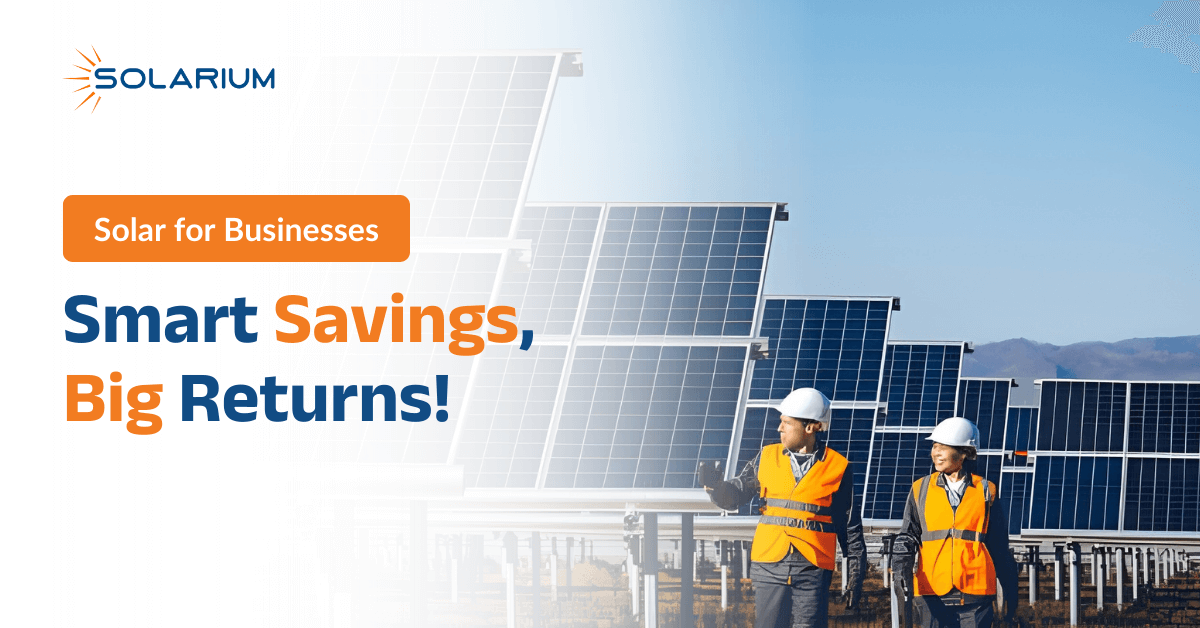In today’s competitive business landscape, solar for businesses is emerging as a game-changing solution that not only cuts energy costs but also strengthens sustainability efforts.
As power charges rise and environmental issues grow, solar power offers more than just a way to reduce utility bills—it empowers businesses to take control of their energy future. By going solar, companies can reduce their carbon footprint, lower operational costs, and position themselves as environmental leaders in their industry.
Solar energy for business isn’t just a smart financial move; it’s an investment in energy independence and long-term stability. With solar power, companies can protect themselves from rising energy prices and mitigate the risks of power outages.
Furthermore, as more consumers and stakeholders prioritize sustainability, embracing solar energy enhances a company’s reputation, fostering loyalty and trust with an eco-conscious audience.
In this blog, we’ll dive into how solar energy can deliver significant cost savings, and transform operations for your business. Along with that, we’ll also see the key steps to implementing an effective solar for businesses strategy.
So, whether you aim to cut expenses or make a meaningful environmental impact, adopting solar power can propel your business into a brighter, more sustainable future.
Financial Benefits of Solar Energy

Companies are constantly looking for new ways to optimize their bottom line and remain agile in an ever-changing market. One of the smartest strategies to achieve this is by embracing solar energy. The financial advantages of adopting solar power are substantial, offering immediate savings on energy bills and long-term financial stability.
But it doesn’t stop there—solar can also help mitigate the volatility of rising energy prices and reduce reliance on fossil fuels.
Here is how solar energy can be a powerful financial tool that helps your business thrive while supporting sustainability goals:
Immediate Cost Savings
A big reason businesses switch to solar is the quick drop in energy costs. Traditional sources like coal and natural gas can have wild price swings that hurt a company’s finances.
However, solar energy offers a more predictable and stable cost, allowing businesses to generate their electricity and rely less on external power sources.
With solar panels in place, a significant portion of energy needs is met by the sun, leading to lower monthly utility bills. Many companies start seeing a return on investment (ROI) in just 3 to 4 years, depending on factors like energy consumption and local incentives.
Long-Term Return on Investment
Solar for businesses isn’t just about short-term savings; it’s a wise investment for the long term. Solar panels typically have a lifespan of 25 to 30 years, giving businesses decades of financial benefits.
As the cost of solar technology continues to decrease, more and more businesses can afford to make the leap to solar. Beyond savings on energy bills, solar energy for businesses can even increase the value of commercial properties, making them more attractive to potential buyers or renters.
In today’s market, properties with solar installations stand out as forward-thinking, eco-conscious investments that appeal to both cost-conscious and environmentally aware-consumers.
Tax Incentives and Rebates
Governments around the world always encourage businesses of all sizes to adopt solar energy, and that’s why they offer a range of financial incentives to make it more affordable.
Through federal tax credits, state rebates, and performance-based incentives, businesses can significantly lower the upfront cost of installing solar systems. One of the most valuable programs is the Investment Tax Credit (ITC), which provides businesses with a substantial reduction in their initial investment.
In addition, certain states offer financial compensation for the electricity generated by solar systems, further enhancing the financial appeal of making the switch to solar. By taking advantage of these incentives, businesses can lower installation costs and strengthen the financial viability of their solar energy projects.
How Solar for Businesses Can Transform Your Company

Incorporating solar energy for businesses isn’t just a smart financial decision—it’s a transformative strategy that can propel your company toward greater efficiency, sustainability, and long-term success.
By harnessing the energy of the sun, businesses can significantly lower their energy costs, gain more control over their energy supply, and strengthen their environmental credentials.
Transitioning to solar is more than just an economic choice; it represents a commitment to future growth, operational resilience, and corporate responsibility. As solar technology continues to advance, the opportunities for businesses grow even more compelling.
In this section, we’ll explore how adopting solar energy can revolutionize your business—from cost savings and energy independence to enhanced brand recognition and property value.
Energy Independence and Reliability
One of the most powerful advantages of going solar is the ability to achieve energy independence. By generating your electricity, you’re less vulnerable to unpredictable price hikes or supply disruptions.
This is especially crucial for businesses that rely on a consistent energy supply to maintain daily operations. With advanced battery storage solutions, companies can store excess energy generated during peak sunlight hours, ensuring they have power even on cloudy days or during outages. This reliability helps businesses avoid unexpected downtimes and keeps operations running smoothly, no matter what.
Enhancing Corporate Sustainability
Adopting solar energy aligns perfectly with the growing shift toward sustainability and corporate responsibility. More and more customers and investors care about taking care of our planet; they’re attracted to businesses that are working hard to cut their carbon emissions!
By using solar power, businesses can dramatically reduce their greenhouse gas emissions and play an active role in the fight against climate change. Solar energy is a clean, renewable energy source that doesn’t release harmful pollutants, allowing companies to minimize their environmental impact.
By making the switch to solar, businesses can proudly showcase their commitment to the planet, either through reports or marketing.
Improving Brand Image and Customer Perception
A commitment to sustainability makes a brand shine brighter in the eyes of consumers! By sharing the journey of the company into solar energy with customers through various marketing platforms and websites, companies can easily set themselves apart from others and get noticed by people who care about the environment.
Also, when businesses invest in solar energy, it becomes part of their story, something people remember! This often leads to more loyal customers, better public relations, and stronger market visibility.
3 Steps to Implement Solar Energy in Your Business

1. Evaluating your energy requirements
The first step in integrating solar energy into your business is understanding how much power you use and when. This starts with conducting an all-inclusive energy audit that provides valuable information about how much electricity your business consumes on a daily basis and when it uses more during the day.
For example, if your business uses heavy machinery at specific times or has extensive lighting needs, these factors will play a significant role in shaping the optimal layout for your solar system.
Additionally, the local climate and geographical location will impact your solar potential. Understanding the amount of sunlight your area receives throughout the year is crucial to selecting an efficient solar system.
Factors like shading from surrounding buildings, the angle of the sun, and typical weather conditions will all influence the effectiveness of your solar panels.
2. Choosing the Right Solar Solution
Once you have a clear understanding of your energy needs, the next step is to choose the right solar for businesses.
There are several solar system options to consider, each with its own set of advantages depending on your business’s location and energy requirements.
Here are the different types of solar systems:
Grid Tied Systems:
These systems are connected to the neighborhood software grid. These solar systems are designed to reduce energy bills without fully depending on solar power.
Grid-tied systems allow you to draw electricity from the grid when sunlight is insufficient and even offer net metering, which credits you for the excess energy your system feeds back into the grid.
Off-Grid Systems:
If your business is located in a remote area where access to the utility grid is limited or unreliable, an off-grid system might be the solution.
These systems operate independently and rely on battery storage to store excess energy produced during sunny periods, ensuring you have a continuous power supply even when the sun isn’t shining.
Hybrid Systems:
A hybrid system combines elements of both grid-tied and off-grid solutions.
It connects to the utility grid for backup power but also incorporates battery storage to ensure uninterrupted energy flow during outages or cloudy days. This approach gives businesses the best of both worlds—grid reliability and backup energy.
When choosing a solar solution, working with a knowledgeable provider is essential. A reputable solar expert like Solarium can guide you through the various options and help you select the system that best meets your unique energy needs.
3. Finding a Reliable Solar Provider
Selecting the right solar provider is one of the most crucial decisions in your solar journey.
A trustworthy provider will ensure your system is properly designed, installed, and maintained to the highest standards, ensuring you get the most value from your investment.
Experience and Expertise:
Look for a provider with a proven track record in commercial solar installations.
Ideally, they should have experience with businesses in your industry and be familiar with the specific energy challenges you face.
Quality of Products:
The longevity and efficiency of your solar system depend on the quality of the panels and other components used.
Ensure that the provider uses high-performing solar panels that meet industry standards for durability and efficiency. Check for warranties to ensure your investment is protected long-term.
Customer Service:
Reliable customer service is essential for addressing any issues that arise during installation and throughout the life of your system.
Choose a provider known for their responsiveness and commitment to supporting you with maintenance, troubleshooting, and ongoing guidance.
Cost and Financing Options:
Be sure to compare quotes from multiple providers to get competitive pricing. Additionally, explore financing options, such as leases, loans, or power purchase agreements (PPAs), to determine the most affordable way to finance your solar system.
Implementing solar energy in your business involves evaluating your energy needs, selecting the right system, and partnering with a trusted solar provider.
By following these steps, you’ll be equipped to make an informed decision that benefits both your bottom line and the environment.
Ready to Power Your Business with Solar?
Solarium can help evaluate your energy needs and provide the perfect solar solution customized to your specific requirements. From selecting the right system to guiding you through the entire process, our expert team ensures a smooth transition to clean, efficient energy.
Real Success Stories: How Sun Benefits Different Businesses
Case Study 1: Ford Motor Company
The Ford Motor Company reached a new level by setting up a huge 1.3 MW solar array at its Michigan Assembly Plant as part of its solar for business strategy. The results were a 20% cut in electricity costs and major tax credits.
Furthermore, Ford proved very committed to building solar energy into its reputation as much as it did green manufacturing leadership, which helped bring them business from environmentally conscious buyers.
Case Study 2: Bharti Airtel
Bharti Airtel, a leading global telecommunications company, has taken a significant step towards sustainability by implementing solar for business with the commissioning of a 21 MW solar power plant in Buldhana district, Maharashtra.
This project, commissioned in 2022, is poised to reduce carbon emissions by a substantial 25,517 tonnes annually. By harnessing solar energy, Airtel aims to significantly reduce its operational costs, particularly in terms of electricity expenditure.
This initiative not only showcases Airtel’s commitment to environmental responsibility but also reinforces its position as a leader in sustainable business practices.
Conclusion: Solar Energy for Business
In conclusion, solar for businesses is a smart and sustainable investment for businesses looking to reduce operating costs while enhancing their environmental impact. The benefits are clear: immediate savings, long-term financial rewards, and even opportunities to strengthen your brand’s reputation as a leader in sustainability.
The key to success?
Start by assessing your energy needs, choose high-quality solar solutions, and partner with a reliable solar solutions provider to guide you through the process. Harnessing the power of the sun isn’t just a smart decision—it’s a step towards a cleaner, more profitable future for your business and the planet.
Together, we can build a sustainable future. Want to know more? Schedule a call with us and let us help you take the first step toward solar power for your home or business.
